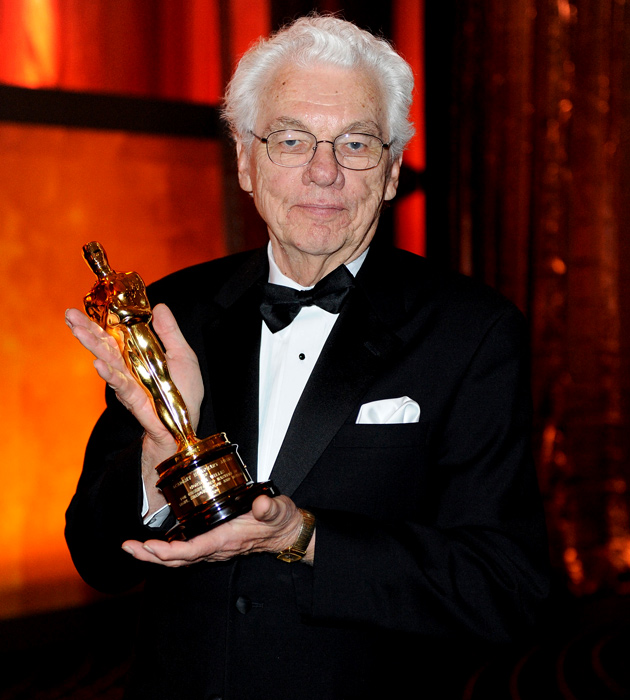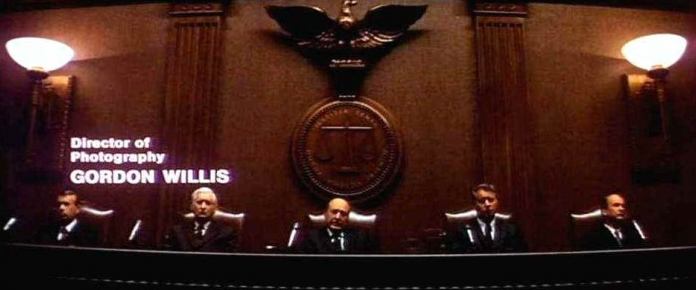RIP: Gordon Willis, cinematography of "The Godfather", "Manhattan", "All the President's Men"...
 Monday, May 19, 2014 at 10:45PM
Monday, May 19, 2014 at 10:45PM Here's one of my personal favorite critics, Tim Brayton, with a gracious crossposting of his lovely obituary for one of the greatest cinematographers who ever lived. - Nathaniel
 It’s not tragic when an 82-year-old man, who had been happily retired for 17 years, following an incredibly strong and well-regarded career, dies. Any of us would be lucky and blessed to have that kind of live and that kind of death. But the loss of Gordon Willis on May 18 is heartbreaking anyway: it’s always heartbreaking when a true genius, visionary, and leader of his field passes away.
It’s not tragic when an 82-year-old man, who had been happily retired for 17 years, following an incredibly strong and well-regarded career, dies. Any of us would be lucky and blessed to have that kind of live and that kind of death. But the loss of Gordon Willis on May 18 is heartbreaking anyway: it’s always heartbreaking when a true genius, visionary, and leader of his field passes away.
Willis was the most important cinematographer of the last 50 years of cinema. I don't know of any clearer or more concise way of putting it. If he'd only shot The Godfather and The Godfather, Part II, a pair of films that fundamentally altered the way people used lighting and focus and the peculiar film stock of '70s American filmmaking, he would be one of the great masters of his field, and his passing a day of mourning for all cinephiles.
A beauty break featuring some of his greatest achievements after the jump...

If he'd only shot the trio of paranoia thrillers with director Alan J. Pakula, Klute and The Parallax View and especially the technically audacious All the President's Men, he'd be one of the great masters of his field.
 Klute (1971)
Klute (1971) All The President's Men (1976)
All The President's Men (1976) The Parallax View (1974)
The Parallax View (1974)
If he'd only shot his extraordinarily gorgeous quartet of black and white movies with Woody Allen - Manhattan, Stardust Memories, Zelig, Broadway Danny Rose - some of them lovingly grain-kissed, some of them hauntingly sharp and clear, all of them so bright and piercingly silvery and sleek that they practically glow, he'd be one of the great masters of his field.
 Manhattan (1979)
Manhattan (1979)Zelig (1983)
 Broadway Danny Rose (1984)
Broadway Danny Rose (1984) Stardust Memories (1980)
Stardust Memories (1980)
But, in fact, he shot all of these, and other great and influential films besides.
If the 1970s can fairly be said to have changed the way that American movies were made, that owes as much to Willis's astonishing new rules for how movies could be photographed as to the contribution of any other individual - if only for their severely underlit rooms, introducing a new way of thinking about shadows and mood that has little to do with the chiaroscuro nightmares of film noir, his early work could only ever be regarded as groundbreaking.
 The Godfather (1972)
The Godfather (1972) The Godfather Part II (1974)
The Godfather Part II (1974) The Landlord (1970)
The Landlord (1970) Interiors (1978)
Interiors (1978) The Devil's Own (1997)
The Devil's Own (1997)
Astoundingly, this undeniable master only received two Academy Award nominations, for Zelig in 1983 and The Godfather, Part III in 1990, winning neither time. In 2010, he was awarded an honorary Oscar, citing his "unsurpassed mastery of light, shadow, color and motion." And that's the least you could say about it; there aren't many people for whom the word "unsurpassed" isn't quite enough, but Willis was one of them. Generations of cinematographers have labored in his shadows, and all of us who love cinema owe him our deepest debt of gratitude, now and forever.



Reader Comments (8)
One of the best. His work in The Godfather films, All the President's Men, The Landlord, and the films of Woody with Manhattan being the best film that Willis shot are among the standard in the art of cinematography. He will be missed though I'm thinking he is talking with Nestor Almendros about lighting strategies.
God he was THE best cinematographer ever. He also did The Purple Rose of Cairo, which I recently watched again, and his work never ceases to amaze me. I should really come up with a top 10 or 25 or 50 shots from his movies because that's how good he was. Everything about the parking garage scenes and the way he lit Hal Holbrook would definitely make the list. The man was an integral part of why movies like The Godfather, Zelig, and The Parallax View work. The only other DP I can think of who had such a signature touch AND changed the game was Gregg Toland way back in the '30s and '40s. That's some great company. I'm really happy that the Academy honored him back in 2009. It's a shame he lost the two nominations he had. Did the guy who shot Dances with Wolves really need to win that year? Rest in Peace Gordon Willis. Another genius is gone.
This is a beautiful write-up that demonstrates why Willis was not just one of the great cinematographers but one of the great cinema artists, period.
On a personal note: Years and years ago, my boyfriend would pull a blank face whenever I would reference a film's photography. (In his defence, we were both still teenagers.) It was only after he saw Gordon Willis's films, and in particular "Manhattan", that he finally understood what great cinematography means to a film.
In other words, the most important relationship in my life would've ended a decade ago if it wasn't for Gordon Willis. RIP.
Of course he was a major genius, but I don`t think his work was more influential than Vittorio Storaro`s, for example, or Sven Nykvist, specially because he didn`t have an international career. The Godfather, a game-changer in terms of cinematography, have influenced people that were following a specific kind of narrative movie. He hadn`t the radical streaks of Storaro, influencing both mainstream and arthouse worlds. In fact, with Allen, Willis` work was an echo of Nykvist.
I'll add a little bit of trivia. The reason why Gordon Willis was not even nominated for arguably some of his greatest works in the '70s (and only got nominated TWICE in his career) is that the Cinematographers Branch at the time disliked him because he had the audacity to say he never wanted to work in Hollywood (or something like that). That resentment extended to his protege Caleb Deschanel who was snubbed for his work in "The Black Stallion" during this time. Thankfully, the Hollywood old guards passed and the Academy came to their senses and awarded Gordon Willis a highly deserved Honorary Oscar just in time.
Irvin-will the same happen to Deschanel at some point, who is still oddly Oscar-less.after five nominations.
I am so in awe of this guy. I would love for Chicago to do a festival for him. I am shocked he didn't get nominated for The Godfather Part II and Manhattan--those movies are pure artistry.
The GF2 snub is especially egregious considering Earthquake was nominated. WTF.
Thanks for this post and the images. I am really sad for his death. RIP, he was a truly genius.